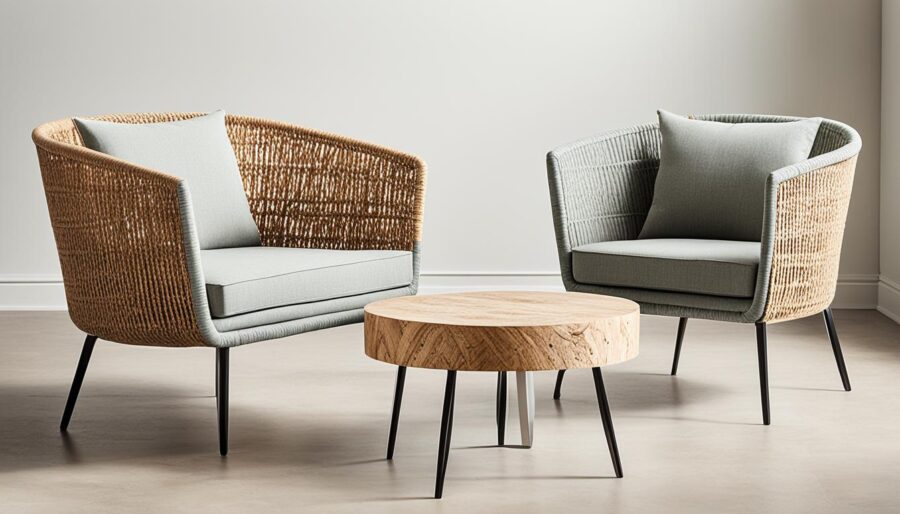
Are you looking to create an environmentally conscious living space that reflects your values? Are you wondering how to make sustainable choices when it comes to furnishing your home? In a world where eco-friendly and ethical practices are increasingly important, finding sustainable furniture brands and materials is key to creating a greener and more conscious home.
But with so many options available in the market, it can be overwhelming to navigate the choices and make informed decisions. How can you identify furniture companies that prioritize sustainability? What materials are eco-friendly and ethically sourced? And how do you know if a furniture brand aligns with your values?
In this article, we will guide you through the process of choosing sustainable furniture brands and materials for your home. We will explore the importance of sustainable home furnishings, understand the criteria for sustainable furniture brands, and provide insights into identifying responsible furniture companies. We will also delve into alternative materials beyond wood and bamboo, and highlight green furniture manufacturers that lead the way in eco-conscious design.
The Growing Importance of Sustainable Home Furnishings
As the world becomes more environmentally conscious, sustainable home furnishings are gaining significant importance. People are increasingly recognizing the impact of their choices on the environment and are seeking eco-friendly alternatives. In response to this growing demand, green furniture makers and ethical furniture brands are emerging, offering sustainable interior design options for conscious consumers.
Conscious consumer choices play a crucial role in shaping a greener future. By opting for sustainable home furnishings, individuals can reduce their carbon footprint and contribute to a more environmentally conscious design. These eco-conscious choices extend beyond furniture materials to encompass every aspect of home decor, including earth-friendly furnishings and eco-conscious home decor.
Environmentally responsible furniture brands are at the forefront of these efforts. They prioritize the use of sustainable materials, such as recycled and renewable resources, to minimize their impact on the environment. Additionally, they embrace eco-friendly manufacturing practices that minimize waste, reduce energy consumption, and prioritize ethical sourcing.
Sustainable interior design is not just a trend; it is a necessity in creating a healthier and more sustainable living environment. By choosing sustainable home furnishings, individuals can create a space that reflects their values while also promoting a greener and more sustainable future.
Understanding Sustainable Furniture Brands
In today’s eco-conscious world, understanding sustainable furniture brands is crucial for making responsible and ethical choices when furnishing your home. Sustainable furniture brands go beyond conventional furniture companies by prioritizing eco-friendly materials, ethical sourcing, and responsible manufacturing processes. By aligning with these principles, these brands not only contribute to a greener planet but also offer high-quality and durable furniture that enhances the aesthetics and comfort of your living space.
One of the key aspects of sustainable furniture brands is their commitment to using eco-friendly materials. These brands prioritize renewable resources and opt for materials that have a minimal impact on the environment. From sustainably harvested wood to recycled materials, these choices help reduce deforestation and waste while promoting a circular economy. By understanding the materials used by sustainable furniture brands, you can make informed choices that support a more sustainable future.
Ethical sourcing is another important pillar of sustainable furniture brands. These companies ensure that their supply chains adhere to fair trade practices and promote responsible labor conditions. By prioritizing the welfare of workers and communities, these brands contribute to positive social and economic impacts. When choosing furniture from ethical brands, you can have peace of mind knowing that your purchase supports ethical practices and the well-being of individuals involved in the production process.
Furthermore, responsible manufacturing is a fundamental practice for sustainable furniture brands. These companies prioritize energy-efficient manufacturing processes, waste reduction, and carbon footprint reduction. By implementing sustainable manufacturing practices, they minimize their environmental impact and strive to create a more sustainable industry as a whole. When purchasing furniture from these brands, you can be confident that your choice aligns with your values and promotes a greener future.
In conclusion, understanding sustainable furniture brands is essential in making conscious and responsible choices for your home decor. From eco-friendly materials to ethical sourcing and responsible manufacturing, these brands are paving the way towards a more sustainable and environmentally friendly future. By supporting sustainable furniture brands, you contribute to the preservation of our planet and promote a greener way of living.
Identifying Responsible Furniture Companies
In the search for sustainable and environmentally friendly furniture, it is essential to identify responsible furniture companies that align with your values. These companies prioritize sustainability and ethical practices throughout their production processes. By supporting these companies, you can be confident that your furniture choices contribute to a greener future.
The Role of Forest Stewardship Council (FSC) Certification
One way to identify responsible furniture companies is to look for those with Forest Stewardship Council (FSC) certification. The FSC is an international organization that ensures responsible sourcing of wood and other materials. Furniture manufacturers that carry the FSC certification adhere to strict guidelines and practices that promote sustainable forestry and the protection of natural habitats. When furniture bears the FSC logo, it signifies that it is sourced from well-managed forests and meets stringent environmental and social standards.
Evaluating the Environmental Impact of Manufacturing
Another crucial aspect of identifying responsible furniture companies is evaluating the environmental impact of their manufacturing processes. Sustainable furniture manufacturers prioritize eco-friendly manufacturing techniques that minimize energy consumption, reduce waste, and mitigate harmful emissions. By choosing furniture from manufacturers committed to sustainable manufacturing practices, you can minimize your carbon footprint and support companies that prioritize environmental stewardship.
| Benefits | Responsible Furniture Companies | Non-Responsible Furniture Companies |
|---|---|---|
| Eco-conscious manufacturing practices | ✓ | ✗ |
| Sustainable sourcing of materials | ✓ | ✗ |
| Reduced carbon footprint | ✓ | ✗ |
| Supports environmental preservation | ✓ | ✗ |
Eco-Friendly Furniture: Beyond Wood and Bamboo
In today’s world, eco-conscious consumers are increasingly seeking sustainable and environmentally friendly options for their homes. When it comes to furniture, many people are familiar with wood and bamboo as eco-friendly materials. However, there are other organic materials and earth-friendly alternatives that can be used in furniture manufacturing.
Organic Materials Furniture Brands:
One of the key considerations for eco-friendly furniture is the use of organic materials. Brands specialize in creating furniture using organic materials such as organic cotton, hemp, and jute. These materials are grown without the use of synthetic pesticides or fertilizers, making them a healthier and more sustainable choice for your home.
When looking for earth-friendly furniture, it’s important to consider manufacturers that prioritize sustainability and use environmentally conscious practices. These materials not only reduce the demand for new resources but also contribute to waste reduction and a circular economy.
Natural Materials Furniture:
Another option to consider is furniture made from natural materials such as seagrass, rattan, or cork. These materials are renewable, biodegradable, and require minimal processing, making them great choices for eco-friendly furniture.
By exploring these alternative materials and the brands and manufacturers that prioritize eco-consciousness, you can go beyond wood and bamboo to create a truly sustainable and environmentally friendly home.
From Seed to Sofa: The Journey of Sustainable Materials
In the furniture industry, the journey of sustainable materials plays a crucial role in creating eco-friendly and socially responsible products. Understanding the lifecycle of sustainable materials is essential for consumers who value environmentally conscious choices.
One aspect of sustainable materials is the use of recycled materials. By conserving resources and reducing waste, furniture manufacturers can contribute to a more sustainable future. Recycled materials can include anything from reclaimed wood to repurposed metals and fabrics. These materials not only reduce the demand for new resources but also prevent valuable materials from ending up in landfills.
Moreover, opting for locally sourced furnishings offers several advantages. Local sourcing reduces the carbon footprint associated with transportation and can support local communities. By choosing furniture made from locally sourced materials, consumers can contribute to the growth of local economies while minimizing the environmental impact of long-distance shipping.
The journey of sustainable materials is one that prioritizes eco-friendly manufacturing practices. By conserving resources through the use of recycled materials and opting for locally sourced furnishings, the furniture industry can take significant steps towards sustainability.
Spotlight on Green Furniture Manufacturers
In this section, we will shine a spotlight on green furniture manufacturers who are at the forefront of sustainable and eco-conscious design. These companies prioritize sustainability and environmental consciousness in their products, providing consumers with a wide range of options for furnishing their homes sustainably.
Notable names in the industry include: EcoLiving Designs: EcoLiving Designs specializes in creating furniture made from reclaimed and repurposed materials. Their innovative designs give new life to old materials, promoting upcycling and reducing waste in the process.
These are just a few examples of the green furniture manufacturers leading the way in the industry. By choosing furniture from these companies, consumers can support sustainable practices and make a positive impact on the environment.
Inside Ethical Home Decor Brands
In this section, we will take a closer look inside ethical home decor brands that prioritize sustainability and ethical practices. These brands understand the importance of creating a stylish and conscious living space that aligns with eco-friendly values. By supporting these ethical home decor brands, consumers can make a positive impact on the environment and contribute to a more sustainable future.
These ethical home decor brands stand out for their commitment to using eco-friendly materials in their products. From sustainably sourced wood to recycled plastics and upcycled materials, these brands prioritize the use of materials that have a lower impact on the environment.
In addition to eco-friendly materials, ethical home decor brands also prioritize fair trade practices. They work closely with artisans and communities to ensure their products are ethically made, providing fair wages and safe working conditions. By supporting these brands, consumers can feel confident that their purchases are contributing to the well-being of individuals and communities.
Ethical home decor brands also make it a priority to support local communities and promote sustainable livelihoods. They often collaborate with artisans and craftsmen from different regions, incorporating traditional techniques and styles into their designs. By supporting these brands, consumers can celebrate diversity and preserve cultural heritage.
When choosing home decor items from ethical brands, consumers can be confident in their commitment to sustainability and ethical practices. By opting for these brands, individuals can create a stylish and conscious living space that reflects their values and contributes to a greener future.
Sustainable Living Room Sets: A Buyer’s Guide
Creating a sustainable and eco-friendly living room starts with choosing the right furniture sets. By opting for sustainable living room sets, you can contribute to a greener future while enjoying stylish and durable pieces. This buyer’s guide will provide you with essential tips and considerations to help you make informed choices that align with your sustainability goals.
Choosing Couches and Chairs with Longevity
When selecting couches and chairs for your living room, it’s important to prioritize longevity and durability. Look for furniture made from high-quality materials that are designed to withstand everyday use. Seek out sustainable furniture sets crafted from responsibly sourced wood or eco-friendly alternatives such as recycled materials or natural fibers. These options not only minimize the environmental impact but also ensure that your furniture stands the test of time.
Exploring Upcycled Furniture Design Options
If you’re looking for unique and sustainable pieces for your living room, consider exploring the world of upcycled furniture design. Upcycling involves transforming discarded materials and items into stylish and functional furniture. By repurposing and giving new life to old furniture or salvaged materials, upcycled furniture not only reduces waste but also adds character and charm to your living space. Embrace the beauty of creativity and sustainability by incorporating upcycled pieces into your sustainable living room set.
| Benefits of Sustainable Living Room Sets | Considerations when Choosing |
|---|---|
|
|
Creating an Eco-Conscious Interior Design
In today’s world, designing an interior space goes beyond aesthetics. It’s about making conscious choices that promote sustainability and reduce our environmental impact. In this section, we will explore the principles and trends of eco-conscious interior design, providing you with valuable insights to create a stylish and environmentally friendly living space.
One of the key aspects of eco-conscious interior design is choosing sustainable furniture. Consider investing in furniture made from eco-friendly materials and produced by ethical furniture brands. Look for certifications such as Forest Stewardship Council (FSC) certification, which ensures responsible sourcing of wood. By selecting sustainable furniture, you can contribute to a greener future while adding style and comfort to your home.
Another important aspect to consider is incorporating natural and recycled materials into your interior design. Natural materials like organic cotton, hemp, and bamboo can be used for upholstery, curtains, and rugs, adding a touch of eco-consciousness to your living space. Additionally, consider using recycled materials for accessories and decor items, such as upcycled wooden furniture pieces or recycled glass vases.
As sustainable interior design trends continue to evolve, it’s crucial to stay informed and up-to-date. Stay connected with the latest eco-friendly design ideas and inspiration through online platforms, magazines, and social media channels dedicated to sustainable living. By keeping your finger on the pulse of sustainable interior design, you can incorporate innovative ideas into your home and lead the way in creating a greener living environment.
Creating an eco-conscious interior design not only benefits the planet but also promotes a healthier and more sustainable lifestyle. By incorporating sustainable furniture, natural and recycled materials, and staying informed about the latest trends, you can create a stylish and environmentally friendly living space that reflects your values and contributes to a better future.
Organic Furniture Companies: A Healthier Choice
In today’s world, more and more individuals are prioritizing their health and seeking out products that contribute to a healthier lifestyle. When it comes to furnishing your home, choosing organic furniture companies can be a smart and conscious choice. Organic furniture is made from non-toxic materials, offering numerous benefits for both your health and the environment.
The Benefits of Non-Toxic Materials
Furniture made from non-toxic materials eliminates the risk of exposure to harmful chemicals commonly found in conventional furniture. These chemicals, such as formaldehyde and volatile organic compounds (VOCs), can off-gas and pollute the indoor air, leading to respiratory issues, allergies, and other health problems. By opting for non-toxic materials, you can create a healthier indoor environment for you and your family.
Furnishings That Promote Better Air Quality Indoors
Organic furniture is crafted using natural and sustainable materials, such as organic cotton, natural latex, and sustainably sourced wood. These materials are free from pesticides, synthetic dyes, and harmful substances, ensuring improved indoor air quality. By reducing the presence of toxins in your home, you can breathe cleaner air and reduce the risk of respiratory ailments.
Investing in healthy furniture from organic furniture companies not only benefits your well-being and indoor air quality but also supports sustainable and ethical practices. By choosing non-toxic materials for your home, you contribute to a greener and more sustainable world.
Navigating the Market for Environmentally Conscious Furniture Makers
In today’s world, there is an increasing demand for environmentally conscious furniture makers who prioritize sustainability and eco-friendly practices. As consumers become more aware of the impact their choices have on the environment, there is a growing need for sustainable furniture options that align with their values and preferences. Navigating the market for environmentally conscious furniture makers can be overwhelming, but with the right guidance, you can make informed decisions that contribute to a greener future.
When exploring the sustainable furniture market, it’s essential to consider the following:
- Research and understand the values and practices of different environmentally conscious furniture makers. Look for brands that prioritize the use of sustainable materials, ethical sourcing, and responsible manufacturing processes.
- Consider the certifications and labels that indicate a furniture brand’s commitment to sustainability. Look for recognized certifications such as Forest Stewardship Council (FSC) certification, which ensures responsible sourcing of wood and other materials.
- Explore the range of eco-friendly furniture options available. From organic materials to recycled and upcycled designs, environmentally conscious furniture makers offer a wide variety of sustainable choices for every room in your home.
- Consider your personal preferences and needs. Determine the style, functionality, and budget that align with your sustainable furniture choices. Whether you’re looking for modern, minimalist designs or classic and timeless pieces, there are environmentally conscious furniture options to suit every taste.
By navigating the market for furniture makers, you can find furniture that not only enhances the aesthetics of your home but also contributes to a healthier planet. Make informed decisions and choose sustainable furniture options that reflect your commitment to eco-friendly living.
Conclusion
Throughout this article, we have explored the importance of choosing sustainable furniture brands and materials for a greener and more environmentally conscious home. We have discussed the growing significance of sustainable home furnishings and the role of conscious consumer choices in promoting a sustainable lifestyle. By understanding sustainable furniture brands and their commitment to eco-friendly materials and responsible manufacturing, consumers can make informed decisions that align with their values.
Identifying responsible furniture companies is crucial in ensuring that our home furnishings have a minimal environmental impact. We have explored the role of certifications such as Forest Stewardship Council (FSC) certification in ensuring responsible sourcing of materials. Additionally, we have highlighted the importance of evaluating the environmental impact of manufacturing processes to make informed choices when selecting sustainable furniture.
While wood and bamboo are popular choices for eco-friendly furniture, we have also delved into alternative materials and designs that contribute to earth-friendly living. From organic materials to innovative recycled options, there are a variety of choices available for those seeking sustainable and stylish furniture.
In conclusion, by choosing sustainable furniture brands and materials, we can make a positive impact on the environment and support ethical practices in the furniture industry. Let us embrace conscious consumerism and strive towards a greener and more sustainable future in our homes.
FAQ
Q: How do I choose sustainable furniture brands and materials?
A: Choosing sustainable furniture brands and materials involves considering factors such as eco-friendly materials, ethical sourcing, and responsible manufacturing practices. Look for certifications like Forest Stewardship Council (FSC) certification and evaluate the environmental impact of the manufacturing processes.
Q: Why are sustainable home furnishings important?
A: Sustainable home furnishings are important because they contribute to a greener and more environmentally conscious world. By choosing eco-friendly and ethically made furnishings, you can reduce your carbon footprint and support brands that prioritize sustainability.
Q: What sets sustainable furniture brands apart?
A: Sustainable furniture brands differentiate themselves by their commitment to eco-friendly materials, ethical sourcing, and responsible manufacturing processes. They prioritize sustainability and offer furniture options that align with conscious consumer choices.
Q: How do I identify responsible furniture companies?
A: You can identify responsible furniture companies by looking for certifications like Forest Stewardship Council (FSC) certification. Additionally, evaluating the environmental impact of their manufacturing processes can help you make informed decisions when choosing sustainable furniture.
Q: What are some alternative materials for eco-friendly furniture?
A: In addition to wood and bamboo, there are alternative materials for eco-friendly furniture, such as organic materials and natural fibers. These materials contribute to earth-friendly and sustainable furniture choices.
Q: How do sustainable materials contribute to eco-friendly furniture?
A: Sustainable materials contribute to eco-friendly furniture by conserving resources through the use of recycled materials. Opting for locally sourced furnishings also reduces the environmental impact of transportation.
Q: Which are some notable green furniture manufacturers?
A: Some notable green furniture manufacturers that prioritize sustainability and environmental consciousness in their products.
Q: How do ethical home decor brands prioritize sustainability?
A: Ethical home decor brands prioritize sustainability by using eco-friendly materials, following fair trade practices, and supporting local communities. They are committed to creating a stylish and conscious living space.
Q: What should I consider when buying a sustainable living room set?
A: When buying a sustainable living room set, consider choosing couches and chairs with longevity and durability. You can also explore the creative design options of upcycled furniture for unique and sustainable pieces.
Q: How can I create an eco-conscious interior design?
A: To create an eco-conscious interior design, choose sustainable furniture, incorporate natural and recycled materials, and follow sustainable interior design trends. This helps reduce your environmental footprint.
Q: Why should I choose organic furniture companies?
A: Choosing organic furniture companies allows you to prioritize non-toxic materials, which contribute to a healthier indoor environment and promote better air quality in your home.
Q: How do I navigate the market for environmentally conscious furniture makers?
A: To navigate the market for environmentally conscious furniture makers, research and explore the options available for eco-friendly furniture. This will help you make informed decisions that align with your values and preferences.




















